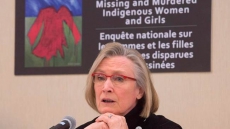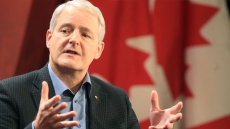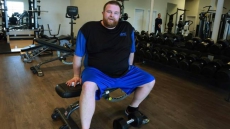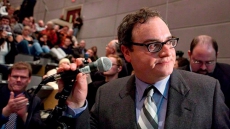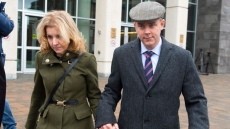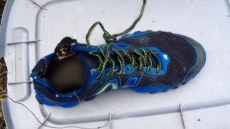TORONTO — Sonia Racco was about to start trying for her second child when she was dealt a surprise blow: breast cancer.
The 36-year-old had no family history of the disease and hadn't even thought much about her breasts until she found a lump while nursing her daughter, Genna.
Suddenly she was bombarded by things to consider: surgery, chemotherapy, drugs. And the need to set aside baby plans for rigorous cancer treatments that could destroy her chance of having another healthy child.
Her oncologist encouraged her to meet with an oncofertility specialist to discuss freezing embryos before starting chemo, but Racco says she was still reeling from the cancer news.
"I was confused. I was scared. All I thought about was Genna," says Racco, an educator who lives and works in Woodbridge, Ont.
"Hearing my daughter call me 'Mom' would destroy me. It was literally two days later. I didn't know my stage, I didn't know my prognosis, I didn't know anything, and here we are talking about freezing things for the future and I don't even know what's ahead of me."
Racco took a couple of weeks to think about it. In the end, she couldn't say no.
"My decision was: Do I live in worry and regret eventually? Or do I just try to live as normal as possible and not have those regrets?" says Racco, now 40, cancer-free and seven months pregnant with a girl.
"If I live 20, 25 years, or 34 years more, would I regret not even attempting to have a second like I wanted?"
Racco — whose cancer was caught late stage 1 — is now on her way to celebrating Mother's Day with thoughts of a second daughter arriving in August.
It's a joyous feeling she quite possibly never would have had if her oncologist, Dr. Ellen Warner, hadn't pushed her to consider preserving her fertility.
Despite the risk of overwhelming patients, Warner says it's important to bring up the issue as soon as possible so women have time to consider options.
"The last thing a woman wants is to come in and be told, 'Oh, your period is starting tomorrow; let's get started tomorrow,'" says Warner, an oncologist at Toronto's Sunnybrook Health Sciences Centre.
But she says a lot of doctors still aren't referring patients to fertility specialists, partly due to "pure ignorance."

"There's still some physicians who believe that if women with breast cancer get pregnant all that flooding of hormones is going to make the cancer come back, which is what we all thought for years until it was shown to be not true at all," says Warner.
Any woman over 30 expecting to undergo chemotherapy should consider preserving her fertility, but so should younger women, she says.
"Some of them might not get married until 35 and then suddenly they realize they don't have 35-year-old ovaries, they have 40- or 45-year-old ovaries" because of earlier cancer treatment.
The process of extracting eggs, fertilizing them and freezing them can take several weeks, so it's not an option if the cancer requires immediate treatment like acute leukemia or an urgent lymphoma, says Racco's infertility specialist, Dr. Karen Glass.
She notes that breast cancer is the most common disease for women of reproductive age.
"For breast cancer it's very easy because there's this natural window of about eight weeks between surgery and chemo where we can get them in," says Glass, also a reproductive endocrinologist and director of the fertility preservation program at Toronto's Create Fertility Centre.
If the woman has a big tumour, they typically see Glass, then get chemo and then undergo surgery, followed by radiation and maybe a course of Tamoxifen.
For smaller tumours, Glass says women often have surgery first, then see her and then get chemo.
Some slower-growing, very responsive tumours like Hodgkin's lymphoma also offer time to preserve fertility, while women with cervical cancer can attempt an egg retrieval before radiation, which puts them in menopause, notes Glass.
And if ovarian cancer appears in only one ovary, doctors can take eggs from the other ovary, she adds.
Racco, Glass and Warner will be part of a webcast Tuesday discussing fertility options for breast cancer survivors including frozen embryo transfer and in vitro fertilization. The webcast is being hosted by the Canadian Cancer Society.
Aside from freezing eggs or embryos, women can also freeze ovarian tissue, but Glass says that is still considered an experimental option.
"If I put an ovary back in, I'm giving back estrogen and maybe that's not a good thing for someone who has estrogen receptor-positive breast cancer," says Glass.
It's more suited to other types of cancers that require pelvic radiation, which will certainly "fry your eggs," says Glass.
"In that case, you have a good reason to take out an ovary and try and save it."
Racco admits she sometimes struggles with the decision to have another child.
"It's up and down, it depends," sighs Racco, who was diagnosed with a cancer that was both estrogen and progesterone positive — both hormones produced during pregnancy.
"Sometimes I don't think about it at all and then sometimes it's on the forefront of my mind. My husband is a wonderful man, very positive, he always thinks very positively that everything will work out....
"For me, it's always a little bit different because I'm a mom and I look at my little one who's only six."

But Racco says she's a firm believer that everything happens for a reason.
"Just like my other daughter," she says. "She came when she was supposed to and she saved my life."

